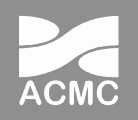Guidelines for the marking of honours degree assessments
PowerPoint
Lists
papers
Index

| Composites Design and Manufacture (Plymouth University teaching support materials) Guidelines for the marking of honours degree assessments |
Lecture PowerPoint |
Reading Lists |
Review papers |
Subject Index |
 |
The marking of honours degree assignments, is not simply a measure of the amount
of work done.
A broad interpretation of the expectations for each degree category follows (see also the generic grade descriptors document).
Note that the actual mark given will depend on a balance of all the aspects
indicated.
It will be weighted to reflect the evidence presented for the work done pro rata
to the proportion of the module marks allocated for the assignment
and the credit rating of the module. To achieve a bare pass (40%) a student
might expect to dedicate 6 hours/week throughout for each ten credit module!.
Third Class Honours (40-50%)
Little evidence of the context (technical/industrial/commercial) of the work
beyond that delivered in the module.
No significant consideration of health and safety issues.
Use of the correct techniques, skills and tools, but without consideration of
all relevant conditions and probably providing incomplete answers [MNJ].
Inadequate presentation of all steps in the analysis.
No record of calibration of the instrumentation.
No/limited consideration of the variability in the results.
Poor report structure.
Lower Second Class Honours (50-60%)
Limited evidence of the context of the work, including references.
Limited consideration of health and safety issues.
Use of the correct techniques, skills and tools, appropriately applied and
giving correct results.
Presentation of all necessary steps in the analysis.
Calibration of the instrumentation considered.
Consideration of the extent of variability in the results.
Structured report with content not always complying with headings.
Upper Second Class Honours (60-70%)
Good evidence of the context of the work, including short literature survey.
Good consideration of health and safety issues.
Consideration of related environmental, economic, social, ethical and
professional issues.
Use of the correct techniques, skills and tools, appropriately applied and
giving correct results, with consideration of the assumptions and limitations
thereof.
Presentation of all necessary steps in the analysis with comment.
Calibration of the instrumentation clearly documented.
Consideration of the extent and causes of variability in the results.
Structured report with content complying with headings.
First Class Honours (>70%)
Extended evidence of the wider context of the work with reference to
contemporary work (ie recent academic/technical journals).
Risk analysis, if appropriate, including health and safety issues.
Critical judgment of related environmental, economic, social, ethical and
professional issues.
Use of the correct techniques, skills and tools, appropriately applied and
giving correct results, with critical consideration of the assumptions and
limitations thereof.
Presentation of all necessary steps in the analysis with critical comment (ideally in an Appendix linked from the body text).
Calibration of the instrumentation clearly documented and critically appraised.
Triangulation of the results obtained against an independent method.
Consideration of the extent, causes and routes to minimisation of variability in
the results.
Clearly written report with internal cross-referencing as required.
Evidence of original thought especially in the context of “quality of life and
wealth creation”.
Report displays engineering flair and imagination [DJG].
Higher degrees
The Harris Report [1] defined the various postgraduate qualifications as follows:
University of Southampton [2] has defined the difference between MPhil and PhD as follows:
The Quality Assurance Agency Discussion paper about doctoral programmes suggested that "doctorates are awarded to students who have demonstrated:
Typically, holders of the qualification will be able to:
and will have: